Joy Neal Kidney's Blog, page 45
December 14, 2022
My Mother’s Coveted Caramels
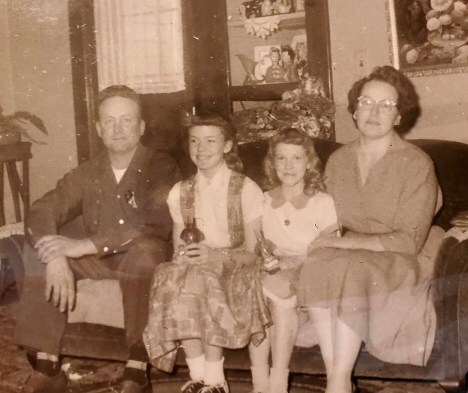 Christmas at Grandpa and Grandma Neal’s (Kenneth and Ruby Neal) on the farm, 1950s. Warren, Joy (holding a gift–the clan drew names ahead of time), Gloria, Doris. I think I’m wearing my longed-for bobby socks!
Christmas at Grandpa and Grandma Neal’s (Kenneth and Ruby Neal) on the farm, 1950s. Warren, Joy (holding a gift–the clan drew names ahead of time), Gloria, Doris. I think I’m wearing my longed-for bobby socks!I was vaguely aware of my mother whipping up her famous caramels every Christmas, at least until they were ready to sample. But I know that certain people, like the postman (namely Jim McMenamin) and others really looked forward to them during the 1950s and ’60s. I wish I could remember who else she rewarded with them.
When the mixture had been cooked and was just right, she stood for ages at the counter and wrapped each 3/4 inch square of deliciousness into waxed paper which she’d precut into just the right sized wrappers.
But I’ve never made it myself. If I did, I’d certainly use her recipe:
Christmas Caramels
2 cups granulated sugar
2 cups white corn syrup
1/2 cup butter (1 stick)
1/4 teaspoon salt
2 cups half and half
2 teaspoons vanilla
Combine all but the vanilla in a heavy saucepan. Cook over low heat, stirring very often, to 255 degrees [on a candy thermometer] or until the mixture forms a firm but not brittle ball in cold water. Add vanilla and turn into buttered pan. Cool, turn uncut on a breadboard & cut into squares and wrap each piece in waxed paper.
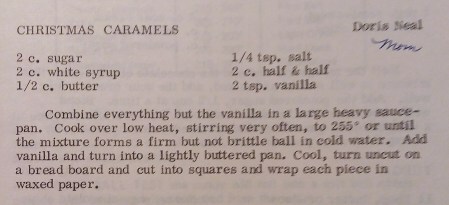 Shared in a local cookbook
Shared in a local cookbookWrapping them meant from side to side, then twisting the ends shut.
On second thought, I think I’ll just enjoy this memory and buy caramels instead.
December 12, 2022
Prose and Poetry Gems by Sally Cronin
These four books by Sally Cronin are rich gems of poetry and short stories. She lives in Ireland so her settings, word choices, and phrases are especially pleasant for this Midwesterner. Sally also offers podcasts of mesmerizing readings of her own works.
Life’s Rich Tapestry: Woven in words

Life’s Rich Tapestry is a collection of verse, microfiction and short stories that explore many aspects of our human nature and the wonders of the natural world. Reflections on our earliest beginnings and what is yet to come, with characters as diverse as a French speaking elephant and a cyborg warrior.
Finding the right number of syllables for a Haiku, Tanka, Etheree or Cinquain focuses the mind; as does 99 word microfiction, bringing a different level of intensity to storytelling. You will find stories about the past, the present and the future told in 17 syllables to 2,000 words, all celebrating life.
This book is also recognition of the value to a writer, of being part of a generous and inspiring blogging community, where writing challenges encourage us to explore new styles and genres.
My thoughts: What a satisfying assemblage of verses, flash fiction, and short stories. I especially enjoyed 99 Words in a Flash, the stories about dogs, about cats, the details in the Speculative Fiction on Great Aunt Georgina. The Duchess photo and verse at the end are priceless. A delightful interlude.
Life is Like a Bowl of Cherries: Sometimes Bitter, Sometimes Sweet

Life is Like a Bowl of Cherries: Sometimes Bitter, Sometimes Sweet is a collection of short stories with scattered poetry, reflecting the complexities of life, love and loss.
The stories in the collection dip into the lives of men and women who are faced with an ‘event’ that is challenging and in some cases life changing.
My thoughts: “Complexities of life, love and loss” underlie this charming collection of short stories with “a sprinkling of poetry.” From living with technology to pets, from decisions about how to spend earnings or winnings, adventures with pets, to one about a wife beater, these stories of challenges and consequences are very satisfying.
Life is Like a Mosaic: Random Fragments in harmony

In this collection, images and syllabic poetry are brought together to tell a story based on the author’s perspective. The poetry explores our human experiences such as love, happiness, hope, aging, friendship, new beginnings, dreams and loss. Life is Like a Mosaic
My thoughts: Delightful poems responding to photographs. Using the syllabic form of poetry, the meter of each short poem is by syllable rather than stresses. Favorites are the poignant “Our Legacy” and the two delightful ones on sunflowers. At the end are longer poems in Slices of Life, which include charming childhood memories.
Variety is the Spice of Life: A blend of poetry and prose

Variety is the Spice of Life is a collection of poetry and short stories about relationships with others, including pets and animals inhabiting the world around us. The connection with others brings love and friendship, excitement and sometimes surprises, danger, mystery and sometimes the unexpected.
My thoughts: The poems, including ones about nature, are delightful. In the US, starlings are considered pests, but Sally’s poems about the glossy birds and their dance of murmuration are winsome. The short stories are especially compelling, including one about the outbreak of WWII. An admirable variety of originality.
The Author
 Sally Cronin is the author of sixteen books including her memoir Size Matters: Especially when you weigh 330lb first published in 2001. This has been followed by another fifteen books both fiction and non-fiction including multi-genre collections of short stories and poetry.
Sally Cronin is the author of sixteen books including her memoir Size Matters: Especially when you weigh 330lb first published in 2001. This has been followed by another fifteen books both fiction and non-fiction including multi-genre collections of short stories and poetry.
As an author she understands how important it is to have support in marketing books and offers a number of FREE promotional opportunities on her blog and across her social media. The Smorgasbord Bookshelf
Sally has been so generous to share others’ books and blogposts through her own. She’s recently featured Leora’s Early Years: Guthrie County Roots as well as my blog post, “Christmas 1943.”
Her podcast shares book reviews, poetry and short stories Sally Cronin Soundcloud
After leading a nomadic existence exploring the world, she now lives with her husband on the coast of Southern Ireland enjoying the seasonal fluctuations in the temperature of the rain.
Please check out Sally’s Amazon Author Page.
December 9, 2022
Debut Novel of Cherie Dargan’s “Grandmother’s Treasures” Series

The year is 2012. Gracie works at the county museum in Jubilee Junction, Iowa, where she is hard at work putting together an exhibit of historic quilts. She struggles with an overbearing boyfriend who is pressuring her to leave her hometown and get a job near him in the big city, juggling three jobs to make ends meet, and trying to serve as peacemaker between her two elderly aunts who can’t seem to stay in the same room together without fireworks going off between them.
This dual timeline timeline adventure begins during a family reunion of sorts, when Gracie inherits a box of cassette tapes, a quilt, and the key to a family secret from from her Grandmother Grace. Gracie and her Aunt Violet listen to the tapes together and are transported back to the early 1940s, to the onset of World War 2, as the elder Grace narrates the tale of how she and her twin sisters, Violet and Vera, traveled from their ancestral home in Iowa to California to help with the war effort.
When Vera hears that Gracie has inherited the “California Quilt,” she will not rest until that relic from the past is destroyed.
The Author
 Cherie Dargan retired from Hawkeye Community College in 2016. She’s the President of her local League of Women Voters, manages several websites, and continues to research her family history, which goes back to the 1850s in Iowa. Her grandchildren are the seventh generation to live in Iowa. She describes her writing as women’s fiction set in the Midwest, with a twist of history, mystery, faith, and love. She’s married to Michael Dargan, and they have two adult children and three grandchildren.
Cherie Dargan retired from Hawkeye Community College in 2016. She’s the President of her local League of Women Voters, manages several websites, and continues to research her family history, which goes back to the 1850s in Iowa. Her grandchildren are the seventh generation to live in Iowa. She describes her writing as women’s fiction set in the Midwest, with a twist of history, mystery, faith, and love. She’s married to Michael Dargan, and they have two adult children and three grandchildren.
She’s webmaster for the Ruth Suckow website, http://www.ruthsuckow.org, a member of the Ruth Suckow Memorial Association (RSMA) and served on the Cedar Falls Authors Festival committee (2016-2018) and is its webmaster, http://www.cfauthorsfestival.org. This celebrates the writing of five best-selling authors with ties to Cedar Falls, Iowa: Bess Streeter Aldrich, Ruth Suckow, James Hearst, Robert Waller, and Nancy Price. She’s written several chapters about Ruth Suckow and the literary history of Cedar Falls.
My thoughts: Sixty-four years of bitterness, all begun during WWII. A family story, brought to life by tapes made by a grandmother. It’s also the story of the granddaughter, who is making difficult decisions of her own as she curates an exhibit of quilts. Besides the tapes, the grandmother leaves a quilt that causes a violent reaction in one family member. A compelling historical novel about consequences and forgiveness.
Each book focuses on a quilt, a time in American history, and has dual timelines and narrators, starting with The Gift. In the present day, Gracie O’Connor learns about her family history, while her Grandmother Grace tells the story of three Iowa farm girls who went to California during WWII.
The Series
Book One, The Gift (WWII and the California patchwork quilt)
Book two, The Legacy (The Civil War and the Rustic Rose quilt)
Book three, The Promise (WWI and Grandma Mary’s Wedding Ring quilt)
Book four, a holiday novella, The Recollection (Depression era and the Crazy quilt)
Book five, The Sacrifice (Vietnam and Uncle Rich’s military valor quilt)
Here’s Cherie’s website.
December 7, 2022
Novels set in the Holy Land–one Contemporary, one in Biblical Times
Both of these novels would be welcome as gifts:
Into the Room by Steven Rogers
 Can a journey across the Holy Land redeem a reluctant pilgrim?
Can a journey across the Holy Land redeem a reluctant pilgrim?
Ben Cahill’s life is an alcohol-saturated mess. After an insincere effort in a rehab facility, he is alienated from his family, out of work, and determined to continue his habit. To make matters worse, he finds himself on a tour of Israel, along with, as he calls them, a bunch of Holy Rollers.
As the trip progresses, Ben experiences the Holy Land’s major historical sites and is exposed to God’s word. He interacts with his fellow travelers, gradually learning about their faith and their lives. Along the way, Ben becomes embroiled in a spiritual war, reinforcing his guilt and, in turn, forcing him to recall his past actions and behaviors. He also begins a different journey, one that leads him to redemption and a place in God’s family.
 The Author: Steven Rogers is an award-winning author and novelist. His novel Into the Room was the first place winner in the Spiritual Fiction Category for the 2022 Eric Hoffer Book Awards. In addition, the book has been named as one of three finalists in the Debut Novel category of the American Fiction Christian Writers Carol Awards.
The Author: Steven Rogers is an award-winning author and novelist. His novel Into the Room was the first place winner in the Spiritual Fiction Category for the 2022 Eric Hoffer Book Awards. In addition, the book has been named as one of three finalists in the Debut Novel category of the American Fiction Christian Writers Carol Awards.
My thoughts: A reluctant and alcoholic traveler, struggling with the mess he’s left his family in, tours the Holy Land with a bunch of “Holy Rollers.” This masterful and conversational story reveals a man who is rotting from the inside out, step by hesitant step, reach a hopeful transformation. It’s a powerful novel demonstrating that at the right time, all stories are worth telling. This one certainly is!
Learn more about Steven Rogers on his website.
The Ninth Hour by Valerie Van Kooten
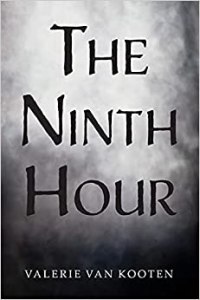 A reluctant bride. An overbearing mother-in-law. An impoverished scribe. A traveler from far away. A young widow. A servant girl. A homesick Roman soldier. A donkey seller’s son.
A reluctant bride. An overbearing mother-in-law. An impoverished scribe. A traveler from far away. A young widow. A servant girl. A homesick Roman soldier. A donkey seller’s son.
Eight lives. Eight people who are barely mentioned in the Gospels, but who will all be changed by an incredible man from Galilee named Yeshua.
As Yeshua follows his path to the Cross, the world is about to change forever. Journey with these ordinary people of the Bible as they come face to face with the ninth hour.
 The Author: Valerie Van Kooten is a writer, journalist, and college writing teacher. She has always been spellbound by the people in the Bible whose stories are largely passed over, but who surely added to the fabric of Jesus’ life. She and her husband live in Pella, Iowa.
The Author: Valerie Van Kooten is a writer, journalist, and college writing teacher. She has always been spellbound by the people in the Bible whose stories are largely passed over, but who surely added to the fabric of Jesus’ life. She and her husband live in Pella, Iowa.
My thoughts: The Ninth Hour brings secondary New Testament characters to life, characters whose lives were enhanced by the strange man Yeshua from Galilee. Highly recommended!
Here is Valerie’s LinkedIn page.
Books set in the Holy Land–one Contemporary, one in Biblical Times
Both of these books would be welcome as gifts:
Into the Room by Steven Rogers
 Can a journey across the Holy Land redeem a reluctant pilgrim?
Can a journey across the Holy Land redeem a reluctant pilgrim?
Ben Cahill’s life is an alcohol-saturated mess. After an insincere effort in a rehab facility, he is alienated from his family, out of work, and determined to continue his habit. To make matters worse, he finds himself on a tour of Israel, along with, as he calls them, a bunch of Holy Rollers.
As the trip progresses, Ben experiences the Holy Land’s major historical sites and is exposed to God’s word. He interacts with his fellow travelers, gradually learning about their faith and their lives. Along the way, Ben becomes embroiled in a spiritual war, reinforcing his guilt and, in turn, forcing him to recall his past actions and behaviors. He also begins a different journey, one that leads him to redemption and a place in God’s family.
 The Author: Steven Rogers is an award-winning author and novelist. His novel Into the Room was the first place winner in the Spiritual Fiction Category for the 2022 Eric Hoffer Book Awards. In addition, the book has been named as one of three finalists in the Debut Novel category of the American Fiction Christian Writers Carol Awards.
The Author: Steven Rogers is an award-winning author and novelist. His novel Into the Room was the first place winner in the Spiritual Fiction Category for the 2022 Eric Hoffer Book Awards. In addition, the book has been named as one of three finalists in the Debut Novel category of the American Fiction Christian Writers Carol Awards.
My thoughts: A reluctant and alcoholic traveler, struggling with the mess he’s left his family in, tours the Holy Land with a bunch of “Holy Rollers.” This masterful and conversational story reveals a man who is rotting from the inside out, step by hesitant step, reach a hopeful transformation. It’s a powerful novel demonstrating that at the right time, all stories are worth telling. This one certainly is!
Learn more about Steven Rogers on his website.
The Ninth Hour by Valerie Van Kooten
 A reluctant bride. An overbearing mother-in-law. An impoverished scribe. A traveler from far away. A young widow. A servant girl. A homesick Roman soldier. A donkey seller’s son.
A reluctant bride. An overbearing mother-in-law. An impoverished scribe. A traveler from far away. A young widow. A servant girl. A homesick Roman soldier. A donkey seller’s son.
Eight lives. Eight people who are barely mentioned in the Gospels, but who will all be changed by an incredible man from Galilee named Yeshua.
As Yeshua follows his path to the Cross, the world is about to change forever. Journey with these ordinary people of the Bible as they come face to face with the ninth hour.
 The Author: Valerie Van Kooten is a writer, journalist, and college writing teacher. She has always been spellbound by the people in the Bible whose stories are largely passed over, but who surely added to the fabric of Jesus’ life. She and her husband live in Pella, Iowa.
The Author: Valerie Van Kooten is a writer, journalist, and college writing teacher. She has always been spellbound by the people in the Bible whose stories are largely passed over, but who surely added to the fabric of Jesus’ life. She and her husband live in Pella, Iowa.
My thoughts: The Ninth Hour brings secondary New Testament characters to life, characters whose lives were enhanced by the strange man Yeshua from Galilee. Highly recommended!
Here is Valerie’s LinkedIn page.
December 5, 2022
Thrillers by Jeff Bailey–Terrorists, Nuclear Power, Nuclear Warheads!
If you like to give books as gifts, here’s a couple for readers who enjoy spine-chilling tales:
The Defect
 Terrorists have infiltrated the staff of the Desert Canyons nuclear power station. They want to melt it down and spread radioactive waste all over Southern California. Think it can’t happen today? Think again. At two in the morning in 2013, an unknown hooded person infiltrated a nuclear power plant in Tennessee. Shots were fired. It never made national news. None of what you read here ever happened, the cover-up was too complete. This story is based on actual events.
Terrorists have infiltrated the staff of the Desert Canyons nuclear power station. They want to melt it down and spread radioactive waste all over Southern California. Think it can’t happen today? Think again. At two in the morning in 2013, an unknown hooded person infiltrated a nuclear power plant in Tennessee. Shots were fired. It never made national news. None of what you read here ever happened, the cover-up was too complete. This story is based on actual events.
My thoughts: While frightening, The Defect would make a compelling film. Even though I know nothing about nuclear reactors, the author masterfully leads the reader through the alertness and security involved, while learning about the characters. The good guys and the terrorists are from all over the world, some drawn by America’s freedoms and job possibilities, some bent on destroying them. The reader is drawn into the thought processes of both, while dealing with radioactive meltdown, which is based on actual events. The possibilities for major destruction are haunting.
Not on My Watch!
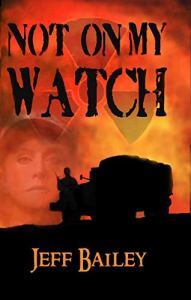
Two nuclear warheads have been stolen, two guards have been murdered in cold blood, and the only witness has given chase. Unarmed and outnumbered, Lance Corporal Cassandra Sing must use all her Marine training to keep her wits about her as she attempts to thwart a group of men who have no problems doing whatever it takes to get what they want…
My thoughts: If you like reading thrillers, thrillers that include terrorists, Not on My Watch is for you. If you love satisfying stories about strong women, even better! The heroine of this one is a young woman Marine, one gutsy gal!
Author Jeff Bailey

I write nuclear conspiracy thrillers novels for a reason. I worked in nuclear related technologies for forty-five years. My first U.S. Army assignment at nineteen years old was to repair and maintain nuclear weapons. In 2012, I retired from the science staff of a national laboratory. In the years in between, I built, initially started, or operated a variety of nuclear power and research reactors.
While I infuse my nuclear resume into my stories, I base the stories themselves on true events from everyday news items. I based my recent fiction release, The Defect, on the actual events surrounding the meltdown and destruction of the Three Mile Island Nuclear Power Station and on the lone gunman attack on Watts Barr Nuclear Power Station. The Wikipedia account of Three Mile Island says that the failure of an air pilot valve contributed to the accident. In The Defect, the defective air pilot valve is the hero.
Welcome to my world.
Jeff Bailey’s website.
December 2, 2022
Leora Frances Wilson: December 4, 1890-December 4, 1987
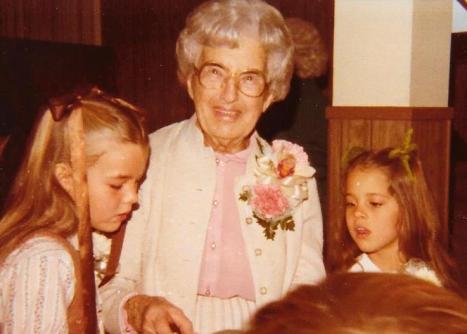 Leora Wilson at the party for her 90th birthday, with great granddaughters Deni and Christa, daughters of Chris and Dennis Scar. December 1980, basement of the First Christian Church, Guthrie Center, Iowa
Leora Wilson at the party for her 90th birthday, with great granddaughters Deni and Christa, daughters of Chris and Dennis Scar. December 1980, basement of the First Christian Church, Guthrie Center, Iowa“LEORA FRANCES WILSON, daughter of Laura Jordan and Milton S. Goff, was born in Guthrie County, Iowa, on December 4, 1890. She passed away at the Guthrie County Hospital, Guthrie Center, Iowa, on December 4, 1987.
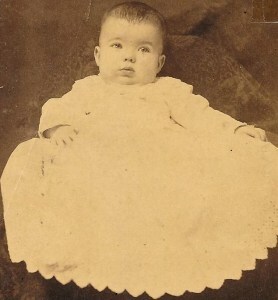
“Leora’s early life was spent in the parental home attending school and growing into womanhood. On February [15], 1914, she was united in marriage to Claiborne Wilson. To this union ten children were born.
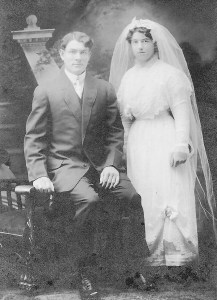 Clabe and Leora Wilson, married February 15, 1914, Wichita, Iowa
Clabe and Leora Wilson, married February 15, 1914, Wichita, Iowa“The family resided in Dexter, Minburn, and Perry and in 1948, moved to Guthrie Center where Leora maintained her own home until her passing. She was a member of the VFW Auxiliary, The American Legion Auxiliary, Rebeccas, the Christian Women’s Fellowship and the First Christian Church of Guthrie Center.
“Many became acquainted with Leora through the years by being a part of these various organizations, but also seeing her work in her yard and to make trips to town shopping. She took a good deal of pride in her flowers and enjoyed sharing them with church members on Sunday mornings.
“Leora was preceded in death by her parents, her husband in 1946, 6 children, [4] brothers and one sister.
“To morn her passing, she leaves her two sons, Delbert Wilson of Fremont, California, Donald Wilson of Raymond, Washington; two daughters, Mrs. Doris Neal and Mrs. Darlene Scar of Dexter, Iowa. As well, there are 9 grandchildren, 18 great grandchildren, 1 great-great grandchild, one sister, Mrs. Ruby Blockley of Long Beach, California, two brothers, Willis Goff of Redlin, Calif., and Clarence Goff of Omaha, Nebraska. As well, other relatives and friends will miss her.”
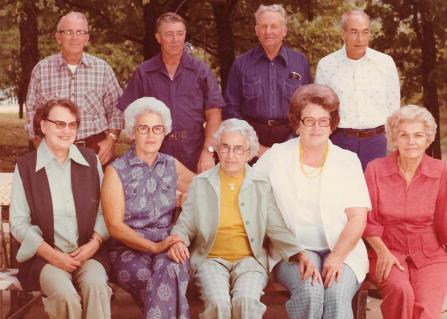 Donald and Rose Wilson are on the left, then Sam and Darlene (Wilson) Scar. Leora is in the middle, then Warren and Doris (Wilson) Neal, then Delbert and Evelyn Wilson. Donald and Delbert lived on the West Coast but both came back to Iowa the September of 1976, when this photo was taken at the Scar home in Guthrie County, Iowa.
Donald and Rose Wilson are on the left, then Sam and Darlene (Wilson) Scar. Leora is in the middle, then Warren and Doris (Wilson) Neal, then Delbert and Evelyn Wilson. Donald and Delbert lived on the West Coast but both came back to Iowa the September of 1976, when this photo was taken at the Scar home in Guthrie County, Iowa.
November 30, 2022
The Delightful “West River Mysteries” by Jolene Stratton Philo
Both Charming Novels Were Published This Year
 It is 1977, and 21-year-old amateur sleuth, Jane Newell, plans to seize life and make it her own as soon as she can get her VW Beetle out of the ditch. Having just graduated from a Midwestern college in elementary education, Jane accepted a teaching position in the small rustic town of Little Missouri, South Dakota. However, she’s not the only subject of local gossip. Round the Bend Bar and Café buzzes with talk of a recent tragedy—a hit and run murder that left one of her new students without a mother and the whole community restless for answers.
It is 1977, and 21-year-old amateur sleuth, Jane Newell, plans to seize life and make it her own as soon as she can get her VW Beetle out of the ditch. Having just graduated from a Midwestern college in elementary education, Jane accepted a teaching position in the small rustic town of Little Missouri, South Dakota. However, she’s not the only subject of local gossip. Round the Bend Bar and Café buzzes with talk of a recent tragedy—a hit and run murder that left one of her new students without a mother and the whole community restless for answers.
Jane’s nose for misadventure pulls her into a humorous tale of mystery among the zany characters surrounding her–from neighbor Merle Laird and his prize cow Snippy to the glitter-hating school janitor, Velma. Amidst the scenic wonder of this quirky little corner of western South Dakota, she begins her new life knowing that someone close to her was undoubtedly a killer, and she is determined to find out who it is.
My thoughts: A plucky young teacher, away from home for the first time, helps solve a who-done-it in small town South Dakota. When a fourteen-year-old student is arrested for murder of another student’s mother, Jane Newell’s problem-solving brain works overtime while she shepherds her class through spelling lessons, hatching monarchs, and glitter projects.
With grit, spirit, a great sense of humor and adventure, she also learns to milk a cow and handle a grumpy cleaning lady, all the while pondering clues. The charge against the student is dismissed, and Jane eventually becomes embraced in the arms of this quirky community. There’s a recipe for Nonskid Pancakes at the end!
—–
 With three months of teaching and one solved mystery under her belt, Jane Newell is back. In short order her Beetle plows into a snowbank, her most rambunctious student hijacks the country school Christmas program, and she stumbles over the body of a teenage boy. Though Sheriff Rick Sternquist warns her not to investigate, Jane ignores his advice when she discovers a tangle of clues. They suggest that the murderer lives where Jane does – Little Missouri, South Dakota (population 92), in the northwestern corner of the state. With the help of cranky school janitor Velma Albright, switchboard operator Betty Yarborough, and neighbor Merle Laird, Jane closes in on the killer and sings her way into the hearts of the community she now calls home.
With three months of teaching and one solved mystery under her belt, Jane Newell is back. In short order her Beetle plows into a snowbank, her most rambunctious student hijacks the country school Christmas program, and she stumbles over the body of a teenage boy. Though Sheriff Rick Sternquist warns her not to investigate, Jane ignores his advice when she discovers a tangle of clues. They suggest that the murderer lives where Jane does – Little Missouri, South Dakota (population 92), in the northwestern corner of the state. With the help of cranky school janitor Velma Albright, switchboard operator Betty Yarborough, and neighbor Merle Laird, Jane closes in on the killer and sings her way into the hearts of the community she now calls home.
My thoughts: Single young teacher Jane Newell prepares her seven students for a Christmas program with the other grade-school teacher in Little Missouri, SD. A whole cast of townspeople look out for Miss Newell, suggesting suitors for her, as she tries to help solve a murder mystery. A boy from a nearby ranch for troubled youth was killed and clues seemed to show up where she would find them. Having been interested in forensics initially, she got herself involved. What predicaments she ended up in, but the perpetrator was arrested, the Christmas program was a success, and Miss Newell heads for Christmas in Iowa with her parents, driving her VW Beetle. A delightful romp, with a recipe at the end.
Author Jolene Stratton Philo

Before I became an author, I taught elementary school for 25 years. 7 of those years were spent in northwestern South Dakota. Our first child was born while we lived there, and our experiences with him resulted in 6 books for the special needs community. My fiction series, West River Mysteries, draws heavily on my years as an Iowan who landed in cowboy country, who taught country school, and who was adopted and cared for by the locals in the tiny town where we lived.
Jolene was recently interviewed on Hello Iowa, WHO-TV 13, about the first two books in her new West River Mysteries series. Other titles in the works: See Jane Dance! and See Jane Dig!

November 28, 2022
Christmas Stories by Dan Walsh make Great Gifts
Christmas Stories by Dan Walsh
 Dan Walsh is the bestselling author of 25 novels (all available on Amazon), including The Unfinished Gift, Rescuing Finley, When Night Comes, and The Reunion (soon to be a feature film). Over 1.2 million copies of Dan’s books are in print or downloaded. He’s won both the Carol and Selah Awards multiple times, 4 of his novels have been finalists for RT Reviews Inspirational Novel of the Year.
Dan Walsh is the bestselling author of 25 novels (all available on Amazon), including The Unfinished Gift, Rescuing Finley, When Night Comes, and The Reunion (soon to be a feature film). Over 1.2 million copies of Dan’s books are in print or downloaded. He’s won both the Carol and Selah Awards multiple times, 4 of his novels have been finalists for RT Reviews Inspirational Novel of the Year.
Reviewers often remark about Dan’s rich, character-driven storylines and page-turning suspense (even with his more inspirational books). He’s been writing full-time since 2010. He and his wife Cindi have been married 45 years, have 2 grown children and 5 grandchildren. They live in the Daytona Beach area, where Dan grew up. You can follow him on Facebook, Twitter, read his blog, or preview all his books by visiting his website.
The Unfinished Gift
 Patrick Collins has three items on his Christmas list. He wants the army to find his father. He wants to leave his grandfather’s house. And he wants–very badly–the wooden soldier tucked away in his grandfather’s attic. Set at Christmastime in 1943, The Unfinished Gift is an engaging family story that reminds us of the surprising things that can affect powerful change in our hearts–-like a young boy’s desperate prayers, a shoebox full of love letters, even a dusty, long-forgotten wooden soldier.
Patrick Collins has three items on his Christmas list. He wants the army to find his father. He wants to leave his grandfather’s house. And he wants–very badly–the wooden soldier tucked away in his grandfather’s attic. Set at Christmastime in 1943, The Unfinished Gift is an engaging family story that reminds us of the surprising things that can affect powerful change in our hearts–-like a young boy’s desperate prayers, a shoebox full of love letters, even a dusty, long-forgotten wooden soldier.
My thoughts: The Unfinished Gift is a heartwarming story of generational conflict perpetuated by unreasonable expectations of duty and respect. The characters draw you into their lives, which are all affected and change throughout the scenes of the story. A wonderful Christmas story.
Keeping Christmas
 For the first time since their children were born, empty nesters Judith and Stan Winters spent Thanksgiving without the kids and grandkids. It’s looking like Christmas will be the same. Judith can’t bring herself to even start decorating for the holiday; her children always hung the first ornaments on the tree, ornaments they’d made each year when they were kids. Stan had nicknamed them the “ugly ornaments” but Judith adored them. Now she can barely look at them. Can this box of ugly ornaments be the key to saving their family Christmas this year?
For the first time since their children were born, empty nesters Judith and Stan Winters spent Thanksgiving without the kids and grandkids. It’s looking like Christmas will be the same. Judith can’t bring herself to even start decorating for the holiday; her children always hung the first ornaments on the tree, ornaments they’d made each year when they were kids. Stan had nicknamed them the “ugly ornaments” but Judith adored them. Now she can barely look at them. Can this box of ugly ornaments be the key to saving their family Christmas this year?
My thoughts: An empty nester struggles with holidays without children and grandchildren. Her oblivious spouse is caught up with bass boat dreams. Reliving Christmas tree aliens, skeleton snowmen, and other memories, they both end up reframing expectations into something even better than they’d hoped. Keeping Christmas is a poignant Christmas story.
Remembering Christmas
 Rick Denton lives his life on his terms. He works hard, plays hard and answers to no one. So when his mother calls on Thanksgiving weekend begging him to come home after his stepfather has a stroke, Rick is reluctant. He’s never liked Art, despite the fact his own father abandoned them when Rick was twelve. Rick’s attitude sours even more when a couple of days helping at the family bookstore turns into weeks of cashing out old ladies and running off the homeless man who keeps hanging about, Slowly but surely, the little bookstore and its quirky patrons—as well as the lovely young woman who works at his side each day—work their magic on him, revealing to Rick the truth about his family, his own life, and the true meaning of Christmas.
Rick Denton lives his life on his terms. He works hard, plays hard and answers to no one. So when his mother calls on Thanksgiving weekend begging him to come home after his stepfather has a stroke, Rick is reluctant. He’s never liked Art, despite the fact his own father abandoned them when Rick was twelve. Rick’s attitude sours even more when a couple of days helping at the family bookstore turns into weeks of cashing out old ladies and running off the homeless man who keeps hanging about, Slowly but surely, the little bookstore and its quirky patrons—as well as the lovely young woman who works at his side each day—work their magic on him, revealing to Rick the truth about his family, his own life, and the true meaning of Christmas.
My thoughts: A small bookstore with a “regular” homeless fella for a neighbor, a family crisis, a CPA with a chip on his shoulder from the past, a single mom with a chipper young daughter who’s making up her own catalogue of Christmas ideas. Dan Walsh takes these elements and spins them into a compelling story about reframing the past and discovering what really makes life worth living. Remembering Christmas is a wonderful story.
Twas the Night
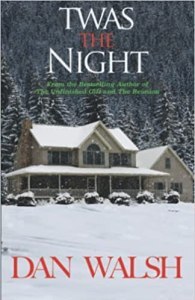 In 1960 just days before Christmas, Theresa Dempsey, a young mother from Brooklyn, experiences an unspeakable tragedy. Two years later, she relocates to Black Rock, a small mountain town in North Carolina, hoping to make a fresh start. About that time, in a little cabin deep in the mountainous woods, young Ransom is trying to survive a day at a time, caring for his sister Emma, and an ailing father as a snowstorm approaches. Back in Black Rock, Deputy Bud Ellison is scrambling to catch a serial burglar, the first real crime this town has seen in years—during the holidays no less. On one remarkable cold, snowy night, the paths of all three of these lives will collide, and change them all forever.
In 1960 just days before Christmas, Theresa Dempsey, a young mother from Brooklyn, experiences an unspeakable tragedy. Two years later, she relocates to Black Rock, a small mountain town in North Carolina, hoping to make a fresh start. About that time, in a little cabin deep in the mountainous woods, young Ransom is trying to survive a day at a time, caring for his sister Emma, and an ailing father as a snowstorm approaches. Back in Black Rock, Deputy Bud Ellison is scrambling to catch a serial burglar, the first real crime this town has seen in years—during the holidays no less. On one remarkable cold, snowy night, the paths of all three of these lives will collide, and change them all forever.
My thoughts: I love how characters, so different from one another and with so much pain in their backgrounds, eventually meet in such an unexpected and poignant story.

—–
Dan Walsh’s The Reunion is the only one of the dozens of books I’ve read this year that reduced me to tears. If you like stories dealing with Vietnam veterans, you’ll appreciate this one.
Dan has written several more books, including Christmas ones. Please also check out his Amazon Author Page.
November 26, 2022
The Jordan House: Son Dan’s Eagle Scout Project

The James Jordan House was the first home in Walnut Township of Polk County, Iowa. It is on the National Register of Historic Places. Our son Dan did Cub Scout and Boy Scout projects there during the years, including his Eagle Scout Project.
It was to restore, using old methods and products, the two east bedroom floors. The project included obtaining donations of the linseed oil, etc., researching OSHA rules and following them, rounding up a few friends to help him scrape old floors by hand, then oil them.
Dan’s project was recently commemorated by a brick on the south side of the stately historic home. Dan and his family, here from the Twin Cities, saw it for the first time over Thanksgiving weekend.

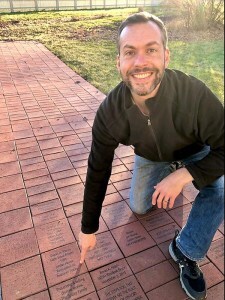
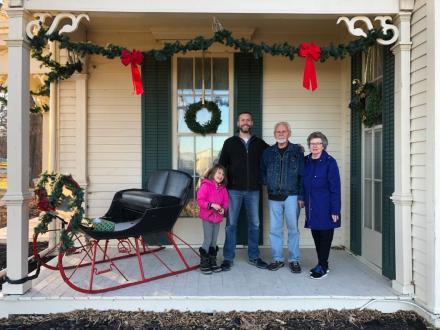 Three generations on the porch of the Jordan House: Kate, Dan, Guy, Joy
Three generations on the porch of the Jordan House: Kate, Dan, Guy, Joy



